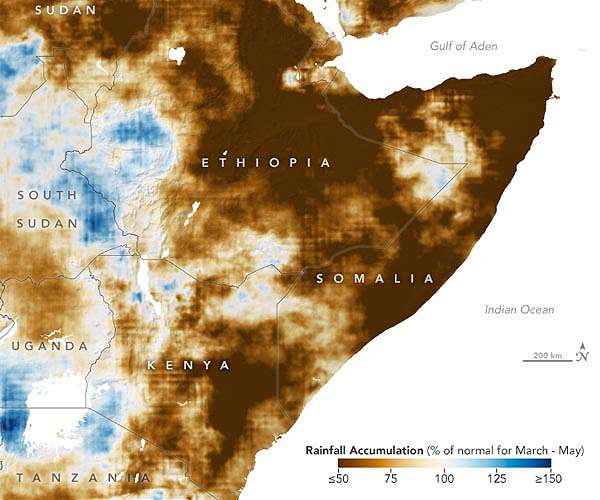El Nino not responsible for East Africa floods: scientists
by AFP Staff Writers
Nairobi (AFP) May 24, 2024
The El Nino weather pattern did not have “any influence” on widespread flooding that killed hundreds in East Africa this year, an expert group of scientists said Friday.
Torrential rainfall in Kenya, Tanzania and neighbouring nations killed more than 500 people, displacing hundreds of thousands as the deluge swept away homes and swamped roads during the March to May monsoon season.
The region was hit by floods late last year as well, with researchers saying that the Indian Ocean Dipole (IOD) — a climate system defined by the difference in sea surface temperature between western and eastern areas of the ocean — contributed to the heavy rainfall.
This year’s rains were believed to have been exacerbated by El Nino — a climate phenomenon typically associated with increased heat that leads to drought in some parts of the world and heavy downpours elsewhere.
But a study published by the World Weather Attribution (WWA) group on Friday found that “researchers did not find any evidence that El Nino or the Indian Ocean Dipole had any influence” on this year’s extreme rainfall.
The network of scientists has developed peer-reviewed methods for quickly establishing the potential role of global warming in specific extreme weather events.
Scientists examined weather data and climate models to compare how rainfall patterns have changed between now and the pre-industrial era as they sought to measure the impact of climate change on the monsoon.
“The extreme rainfall that led to destructive floods in Kenya, Tanzania and other parts of East Africa is becoming more intense, with climate change as one of the drivers,” researchers said.
“The best estimate is that climate change made the event twice as likely and five percent more intense,” they said, adding a caveat that the findings also had to take “a large mathematical uncertainty” into account.
The study covered the “maximum 30-day rainfall” during this year’s monsoon season, with researchers pointing out that “heavy rainfall will continue to increase in the region with further warming.”
– Improve infrastructure –
The study urged governments in the region to improve infrastructure and protect ecosystems to save lives and help citizens cope with the heightened risk of climate disasters, especially in densely populated urban areas.
East Africa and the Horn of Africa are among the regions most vulnerable to climate change — even though the continent’s contribution to global carbon emissions is a fraction of the total.
Over 300 people died in rains and floods in Ethiopia, Kenya and Somalia late last year, just as the region was trying to recover from its worst drought in four decades that left millions of people hungry.
A WWA study on last year’s floods in East Africa called for the urgent phasing out of fossil fuels and reduction of emissions globally.
Related Links
Bringing Order To A World Of Disasters
When the Earth Quakes
A world of storm and tempest
The content herein, unless otherwise known to be public domain, are Copyright 1995-2024 – Space Media Network. All websites are published in Australia and are solely subject to Australian law and governed by Fair Use principals for news reporting and research purposes. AFP, UPI and IANS news wire stories are copyright Agence France-Presse, United Press International and Indo-Asia News Service. ESA news reports are copyright European Space Agency. All NASA sourced material is public domain. Additional copyrights may apply in whole or part to other bona fide parties. All articles labeled “by Staff Writers” include reports supplied to Space Media Network by industry news wires, PR agencies, corporate press officers and the like. Such articles are individually curated and edited by Space Media Network staff on the basis of the report’s information value to our industry and professional readership. Advertising does not imply endorsement, agreement or approval of any opinions, statements or information provided by Space Media Network on any Web page published or hosted by Space Media Network. General Data Protection Regulation (GDPR) Statement Our advertisers use various cookies and the like to deliver the best ad banner available at one time. All network advertising suppliers have GDPR policies (Legitimate Interest) that conform with EU regulations for data collection. By using our websites you consent to cookie based advertising. If you do not agree with this then you must stop using the websites from May 25, 2018. Privacy Statement. Additional information can be found here at About Us.
>>> Read full article>>>
Copyright for syndicated content belongs to the linked Source : IndoDaily – https://www.terradaily.com/reports/El_Nino_not_responsible_for_East_Africa_floods_scientists_999.html
